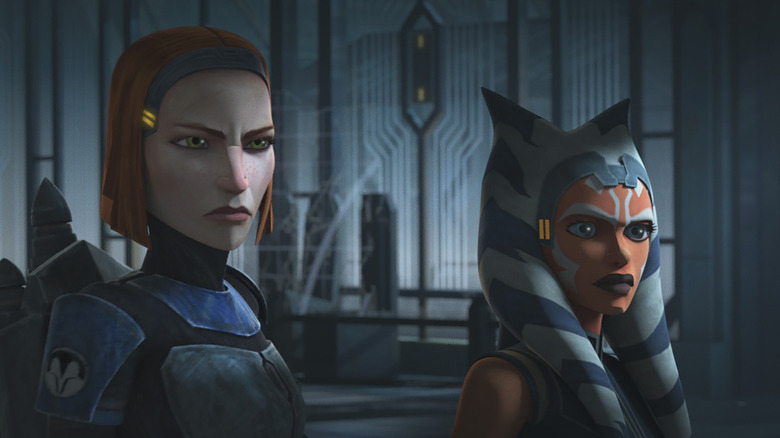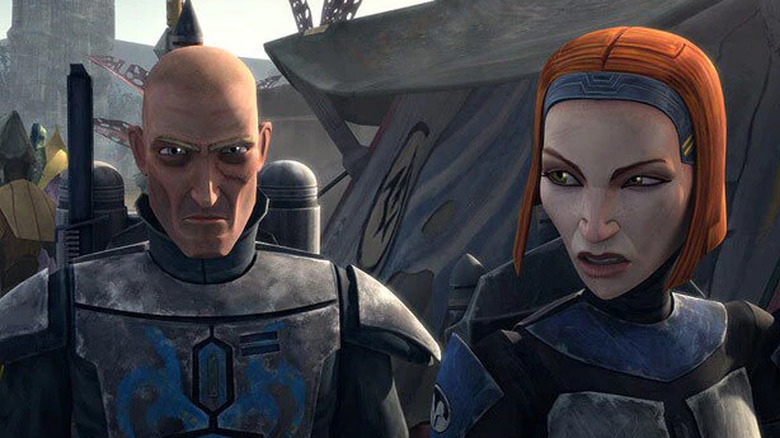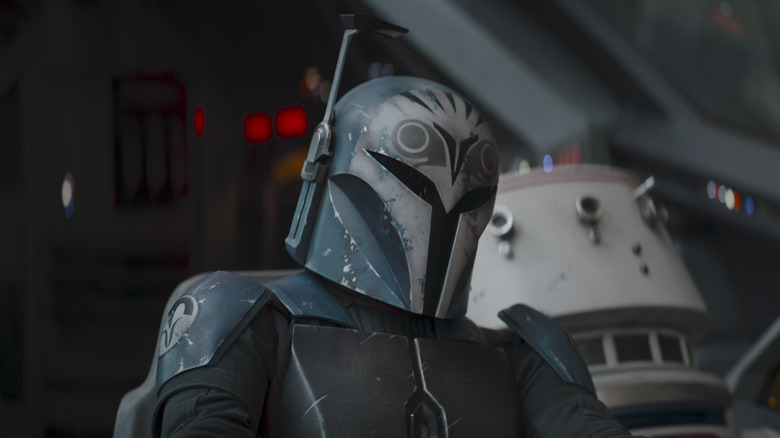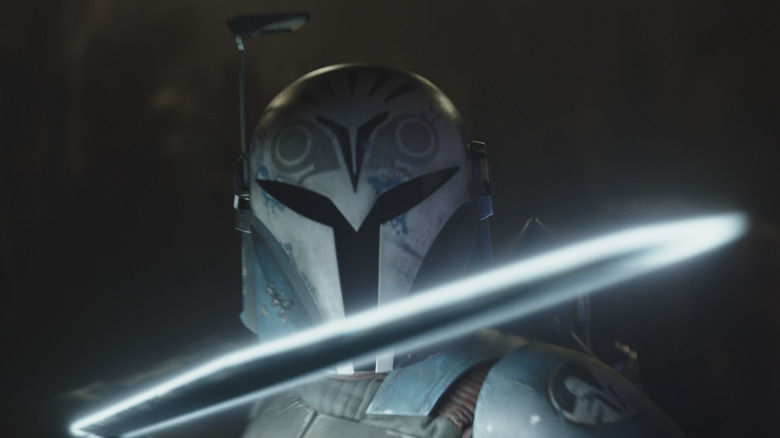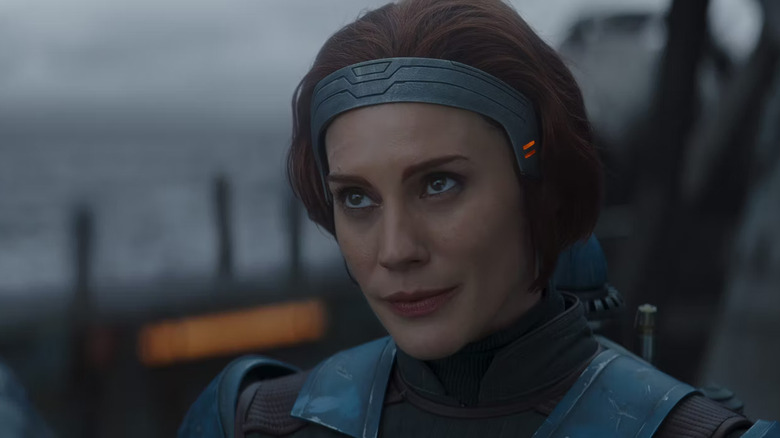The Deeper (And Dark) Meaning Behind Bo-Katan's Redemption In The Mandalorian Season 3
From animation to live-action, the Mandalorian known as Bo-Katan Kryze (both iterations played by Katee Sackhoff) has gone through a messy redemption quest. Perhaps "redemption" may be too generous of a word. Kryze is a woman of many facets: extremist warmonger, attempted savior of Mandalore, violator of Mandalorian treaties by teaming up with the Republic military, (apparent) rightful wielder of the Darksaber, and now a guest member of a Mandalorian cult.
Bo-Katan walked many convoluted and compelling paths in the name of liberating her shattered Mandalore homeworld. Like the symbol of the Darksaber, Bo-Katan's idea of liberating and leading Mandalore has assumed many shapes, some unsavory and some noble, but always shaded by gray morality. The most recent chapter of "The Mandalorian, "The Pirate," steers Bo-Katan back into the higher calling of unifying Mandalore, but in a way that also belies the atrocities of her past allegiances.
In season 3, episode 3 of "The Mandalorian," Bo-Katan confides in the titular Din Djarin over her sadness at witnessing Mandalorian fight Mandalorian, "killing each other for reasons too confusing to explain." She's referring to the Euphemism of the Galactic Millennium. The history was screwed up. And Bo-Katan's colossal screw-ups played a part in Mandalorian civil wars. The quote also illuminates her own regrets while conveniently leaving out the details.
Dark origins
From her intro in season 4, episode 14 of "The Clone Wars" animated series, Bo-Katan began her existence as the lieutenant to the sinister Pre Vizsla (voiced by "The Mandalorian" showrunner Jon Favreau) of Death Watch, an extremist terrorist group hellbent on restoring the Mandalorian warrior ways that were wiped out by the pacifist New Mandalorian movement led by Duchess Satine Kryze (Bo-Katan's sister). We know at some point in her youth, Bo-Katan splintered from Satine's New Mandalorian pacifism to join Death Watch.
Bo-Katan was firmly on the villainous side. She carried out Pre Vizsla's order to enslave and slaughter a village of Carlac's Ming Po civilians. Later, when Death Watch teamed up with the fallen Sith Maul and his crime syndicates, Bo-Katan participated in Death Watch's staged attacks against Mandalore, all so Death Watch can play the "saviors" of Mandalore against the outsiders. These campaigns turned Mandalorian civilians against Satine's pacifism. (Bo-Katan also slapped Ahsoka Tano on the butt, and Ahsoka weirdly seemed to have forgotten that.)
Kryze's shaky path to atonement was (arguably) spurred by the political chaos that followed. When Maul successfully dueled Pre Vizsla for the rulership and Darksaber, Bo-Katan took her dissenting Nite Owls and vowed to overthrow Maul (a non-Mandalorian outsider she despised) in the name of Mandalore. After a failed attempt to liberate the very sister she imprisoned, Bo-Katan mourned for the unity that could have been, suggesting that she was willing to compromise with New Mandalorian ideals for a better Mandalore.
Constant defeat
By the time "Star Wars Rebels" rolled around, Kryze found herself leading fellow clans to fend off the Imperials and pro-Imperial Mandalorians. A young Mandalorian ally, Sabine Wren (Tiya Sircar), ended up granting Bo-Katan the Darksaber, the symbolic saber of Mandalorian leadership. However, Bo-Katan lost the saber and Mandalore to the Imperial Moff Gideon (Giancarlo Esposito).
In her first live-action appearance in season 2 of "The Mandalorian," Bo-Katan made it her mission to retrieve the Darksaber to reunify her supporters. But the plotting of Moff Gideon landed the saber in Din Djarin's ownership, and Bo-Katan's supporters abandoned her. Though Kryze ended up re-wielding it when rescuing Din Djarin, the dispute over Darksaber ownership has curiously been placed on the backburner for now.
After a period of inactive depression for Kryze, "The Mandalorian" season 3, episode 5 has been a recent benefit for her. After two episodes of being sheltered by the Children of the Watch faction (where they observe keeping their helmets on), Bo-Katan has grown a little more comfortable with their community and their Way, despite her initial scoffing at their austere rituals. She even grows to trust the Armorer (Emily Swallow), chieftain of the Children of the Watch, to divulge her sighting of the Mythosaur in Mandalore's Living Waters, which the Armorer interprets as a sign of a shifting era.
The turning point on Nevarro
Navarro marks a major turning point for Bo-Katan as well as her Children of the Watcher hosts. Out of loyalty to her friend, Bo-Katan joins Din Darin's honor-bound quest to help Magistrate Greef Karga and his Nevarro civilians from pirates. In the shadow of Bo-Katan's past atrocities, the situation is quite meaningful. Here, she and a Mandalorian faction save the civilians from a genuine threat. There is a sense of a fair transaction between the saved and saviors: She's helping the Mandalorians find a new home and possibly granting Nevarro a new league of trained protectors.
The image of armored Mandalorians and Nevarro's locals taking arms against the pirates also may insinuate an understanding of a peaceful co-existence for their future. Or it may also signify the historic irony that can't wipe the slate. As former sharpshooter Migs Mayfield once pointed out, Mandalorian history generally involves bloodshed, which underlines how Mandalorians can be both oppressed and be oppressors.
Kryze's involvement on Nevarro seemed to have inspired some reflection in the Armorer. In a dramatic revisal of her rules, the Armorer permits Bo-Katan to remove her helmet and declares her as the one who "walks both worlds" and therefore the unifier of all Mandalorians. Her counsel revitalizes Bo-Katan's quest to rebuild Mandalore with the support of the Children of the Watch.
This raises questions
Amid controversy that "The Mandalorian" is glorifying the Children of the Watch's cultish behavior, it remains to be seen whether the show would flesh out the unscrupulous side of this Watch. It's unclear whether this Watch associated with Death Watch (a faction that does not observe the strict "keep helmets on" practice) that staged attacks to drive support for the warrior ways. In addition, the Children of the Watch member Paz Vizsla, who shares a bloodline with Pre Vizsla and a voice actor in Favreau, has indicated no opinions about Death Watch.
If some fans prove correct that Death Watch and the Children of the Watch were involved with Din Djarin's decimation of his birthplace and subsequent integration into the Children of the Watch, is there a reckoning for Din Djarin and Bo-Katan? If so, Djarin would have to face that his faith — and therefore Gorgu's Mandalorian upbringing — was built upon deception, just as Bo-Katan would face her culpability in the tragic backstory of Djarin and many others.
The ending of "The Pirate" (intentionally or not) begs us to ask, is the Armorer manipulating Bo-Katan for her own designs? Their meeting is cloaked with the apprehensiveness in Ludwig Göransson's scoring and Bo-Katan's perplexity. It can be read as the Armorer feeding Bo-Katan all this validation to manipulate her into a certain path. Either way, "The Pirate" ends with Bo-Katan willing to walk yet another path with an uncertain yet hopeful glow on her smile.
"The Mandalorian" streams on Disney+ with new episodes arriving on Wednesdays.
